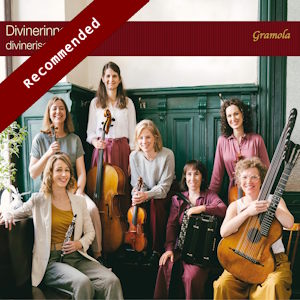
Divinerisch!
Divinerinnen
rec. 2024, Unterretzbach, Austria
Gramola 99345 [60]
From the delightful traditional polka with which this disc opens to the traditional Ländler which closes it, this is a superlative album, full both of traditional pieces in newly-made arrangements and works by frequently forgotten composers; these are balanced by new works from contemporary composers. Highlights include the wit and grace of the ‘Pinagl Marsch’ (attributed either to Anton Pischinger (1862-1933) or his son of the same name (1878-1955) and the elegance and rhythmically subtle ‘Dombacher Ländler’ by Joseph Lanner. The whole is played in a lively and airy fashion by the superlative septet Divinerinnen. An all-female ensemble, Divinerinnen never loses touch with the folk traditions on which their material is based, yet at the same time they give it a distinctive modern stamp of their own.
Of the named composers who are represented on Divinerisch!, I have to confess that there are only a few with which I was previously familiar – particularly Fritz Kreisler and Joseph Lanner. There is, of course, a significant difference between the two; Kreisler was a major figure in the classical world, a star of concert halls across the globe, while Lanner (also a violinist) was a leader of Austrian dance orchestras and thus a more ‘local’ figure, his compositions being at their most popular in the 1830s and 1840s. Turning to more recent figures, Helmut Thomas Stippich is described on his website as a musician, singer, composer and arranger. His ‘Divinerisch!Marsch’ was the very first work to be commissioned by Divinerinnen. As the unsigned booklet note observes, it “bubbles with joie de vivre and playfulness and is reminiscent of circus and film music from the early 20th century”. Another modern piece in the programme is the penultimate track, ‘Galopp!’ by Roland Josef Leopold Neuwirth, of whom Barbara Boisits observes in the Oesterreichichsen Musiklexikon Online that the work of his ensemble Schrammelmusik constitutes “a bridge between traditional Viennese folk music and other musical areas such as rock ‘n’ roll, jazz, blues”. Himself a composer, guitarist and singer Neuwirth, like the members of Divinerrinen, is a major contributor to the renewal of traditional Viennese music. His ‘Galopp!’, as played here by Divinerinnen is a thoroughly modern ‘take’ on the ballroom dance familiar from compositions by such as Johann Strauss II. It is also related to other adaptations of the galop like Liszt’s ‘Grand Galop Chromatique’ or ‘The Comedians Galop’ by Kabalevsky. There are many other fascinating links and connections one might consider in the context of this album, but that will have to do for now.
I would rather end by celebrating the musicianship of the seven members of Divinerinnen, who capture perfectly the spirit of this music; the group’s concern is ultimately scholarly (in what is essentially a project to preserve and continue a tradition) but the cold hand of pure scholarship is entirely absent from their music-making. The internal balance of the instruments is perfect, as is the unanimity of phrasing; one senses that they are having great fun (without being anything other than serious about what they are doing). This can readily be confirmed by visiting YouTube and watching videos of the ensemble in performance. Every member of Divinerinnen plays with a smile on her face; and I find myself listening with a similar (though less attractive) smile on my face! I suspect that the reaction of most readers of MusicWeb International would be the same. A word of praise, too, for Gramola – an enterprising label, associated with the specialist Classical shop of the same name (in the centre of Vienna (Graben 16, 1014 Wien), which should be a key point of call during any visit to Vienna. The label promotes (though not exclusively) the work of musicians based in Vienna.
Glyn Pursglove
Buying this recording via a link below generates revenue for MWI, which helps the site remain free



Contents
Traditional (arr. Theresa A. Aigner)
Husarenpolka
Traditional (arr. Erna Ströbitzer)
Geh i her über d’Alm
Traditional (arr. Walter Deutsch, 1923-2025)
Linzer Tänze
Erik Arnold (1892-1962, arr. Anna M.Eiger)
Heute is ausg’steckt für Soda mit ohne
Helmut Thomas Stippich (b.1979)
Divinerisch! Marsch
Traditional (arr. Erna Ströbitzer)
Trutscherl-Tanz
Anton Pischinger, Senior (1862-1933) or Anton Pischinger, Junior (1878-1955)
Pinagl-Marsch
Hans von Frankowski (1888-1945)
D’Weana Tanz san der höchste Spinat
Josef Mikulas (1886-1980)
Special-Tänze
Carl Lorens (1851-1909, arr., Divinerinnen)
Hausball bei Březina
Johann Schrammel (1850-1893), arr. Josef Miklaus (1886-1980)
Käthchen Conzert-Polka
Joseph Lanner (1801-1843) arr. Therea A. Aigner
Dombach Ländler, Op.9.
Vinzenz Stelzmüller (dates unknown, active in 1850s and 1860s, arr. Divinerinnen)
Debardeurs-Tänze
Manfred Kammerhofer (b.1956, arr. Erna Ströbitzer)
Mit Lust und Laune! Walzer
Fritz Kreisler (1875-1962, (arr. Julia Brunner)
Kleiner Wiener Marsch
Roland Josef Leopold Neuwirth (b. 1950, arr. Tscho Theissing, b. 1959)
Galopp!
Traditional, arr. Divinerinnen
Jeutendorfer Ländler
Performers
Theresa Aranya Aigner, Julia Brunner (violins), Stefanie Kropfreiter (viola), Anna Maria Eigner (cello), Marie-Theresa Stickler (Viennese button accordion, vocals), Andrea Götsch (clarinet), Erna Ströbitzer (contraguitar, vocals)

















